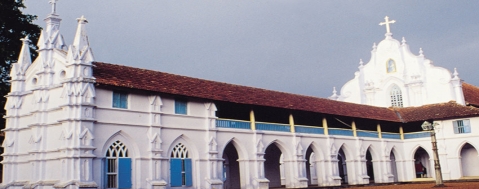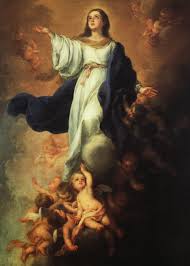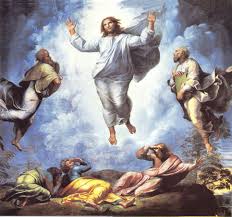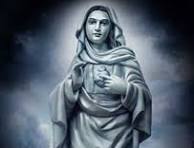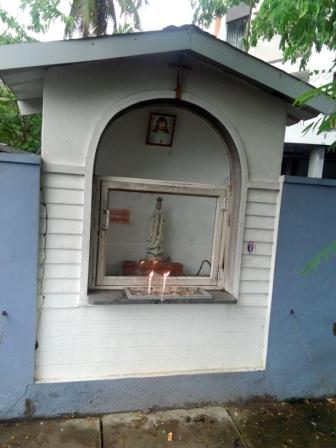THOUGHTS FOR THE MONTH: OCTOBER- 2025:
\r\n“Like a pearl without a flaw, set in the crown of the King; such is the Holy Virgin Mother of God. Her brightness shines like the sun from all sides. Her memory is celebrated in heaven and on earth.” St. Ephrem- (from “Prayer with the harp of the Sprit; Vol; I by Fr. Francis Acharya)
\r\n“The Gita’, says Gandhiji, ‘is not a historical discourse. It is not the description of war between cousins, but between two natures in us- the Good and the Evil. The field of battle is our own body. An eternal battle is going on between the two camps as the poet seer vividly describes it. Krishna is the dweller within; ever whispering to a pure heart.” Mahadev Desai: The Gita according to Gandhiji.
\r\n“Out of me, both little and great, rich and poor, as from a living fountain draw living water. And they who freely and spontaneously serve me shall receive grace upon grace. But he, who would glory himself in me and delight himself in some private good shall not be established in true joy; nor shall his heart be enlarged; but he shall meet with many obstacles and anxieties. Therefore, you must not ascribe any good to yourself nor attribute special virtue to any man, but refer all to God, without which, man has nothing. I have given you all, and I want all to be returned to me again; and with great strictness I require thanks for all that I give.” Thomas A Kempis: Imitations of Christ: Book III: Ch:
SAINTS / SAGES/ EVENTS: OCTOBER- 2025:
\r\nOctober 01. St. Therese of Lisieux: (1873-1897): She was a French Discalced Carmelite nun. She is popularly known as \"The Little Flower of Jesus.\" Therese has been a highly influential model of sanctity for Roman Catholics and for others because of the \"simplicity and practicality of her approach to the spiritual life.\" Together with St. Francis of Assisi, she is one of the most popular saints in the history of the church. Pope Pius X called her \"the greatest saint of modern times.\"
\r\nOctober 02. Gandhi Jayanti: The Birth day of Mahatma Gandhi; (1869-1948): The Father of Indian Nation: Mohandas Karamchand Gandhi was the preeminent leader of Indian nationalism in British-ruled India. Employing non-violent civil disobedience, Gandhi led India to independence and inspired movements for civil rights and freedom across the world. “We may all be happy and grateful that destiny gifted us with such an enlightened contemporary, a role model for the generations to come. Generations to come will scarce believe that such a one as this walked the earth in flesh and blood.” Albert Einstein.
\r\nToday is also the Feast day of All Guardian Angels.
\r\nOctober 03. Sts Ewald the dark and Ewald the fair: (Martyred in 692): Both bore the same name, but were distinguished by the difference in the colour of their hair and complexions. They are now honored as saints in Westphalia, Germany.
\r\nOctober 04. St. Francis of Assisi: (1181-1226): Founder of the Franciscan Order, born at Assisi in Umbria, Italy. Though he was never ordained to the Catholic priesthood, Francis is one of the most venerated religious figures in history. He is known as the patron saint of animals, the environment, and is one of the two patron saints of Italy (with Catherine of Siena).
\r\nOctober 05. St. Faustina Kowalska: (1905-1938): She was a Polish nun who has been canonized as a saint by the Roman Catholic Church. She is considered to have been a mystic and visionary and is known and venerated as the Apostle of Divine Mercy.
\r\nOctober 06. St. Faith: (Martyred in 290): Her legend recounts how she was arrested during persecution of Christians by the Roman Empire and refused to make pagan sacrifices even under torture. Saint Faith was tortured to death with a red-hot brazier.
\r\nOctober 07. The Feast of Our Lady of the Rosary: It is the commemoration of the decisive victory of the combined Christian fleet in 1571 at the Battle of Lepanto defeating an Ottoman fleet off western Greece. Pius V then instituted \"Our Lady of Victory\" as an annual feast to commemorate the victory, which he attributed to the Blessed Virgin Mary. In 1573, Pope Gregory XIII changed the title of the \"Feast of Our Lady of Victory\" to \"Feast of the Holy Rosary.\" Today is also the feast day of St. Artaldus: (1101-1206): He was a 13th century Carthusian Bishop of Belley.
\r\nOctober 08. St. Reparata: (Martyred in 3d century): She was supposedly a twenty year old girl in Caesarea who was denounced as a Christian during the persecutions launched by Emperor Trajan. She was tortured and thrown into a furnace. Miraculously surviving the flames, she still refused to sacrifice to the pagan gods and the Romans beheaded her.
\r\nOctober 09. St. Denis: (Martyred around 258): He was Bishop of Paris. He was martyred in connection with the Decian persecution of Christians, shortly after 250 AD. After his head was chopped off, Denis is said to have picked it up and walked ten kilometres (six miles), preaching a sermon the entire way, making him one of many cephalophores in hagiology. He is venerated in the Roman Catholic Church as patron of Paris, France, and as one of the Fourteen Holy Helpers.
\r\nOctober 10. St. Francis Borgia: (1510-1572): He was the fourth duke of Grandee, a Spanish Jesuit, and the third Superior General of the Society of Jesus. Historians describe Francis as the greatest General after St. Ignatius. He founded the Collegium Romanum, which was to become the Gregorian University; advised kings and popes, and closely supervised all the affairs of the rapidly expanding order. Yet, despite the great power of his office, Francis led a humble life, and was widely regarded in his own lifetime as a saint.
\r\nOctober 11. St. Damien of Molokai: (1840-1889): He was a Roman Catholic priest from Belgium and member of the Congregation of the Sacred Hearts of Jesus and Mary. He won recognition for his ministry in the Kingdom of Hawaii, to people with leprosy (also known as Hansen\'s disease), who had been placed under a government-sanctioned medical quarantine on the island of Molokai. He eventually contracted and died of the disease, and is considered a \"martyr of charity\". Father Damien was canonized by Pope Benedict XVI on Sunday October 11, 2009.
\r\nOctober 12. St. Wilfrfrid: (633-710): He was an English bishop and saint. St. Wilfrid was an outstanding personage of his day, extremely capable and possessed of unbounded courage, remaining firm in his convictions despite running afoul of civil and ecclesiastical authorities. He helped bring the discipline of the English Church into line with that of Rome. He was also a dedicated pastor and a zealous and skilled missionary; his brief time spent in Friesland in 678-679 was the starting point for the great English mission to the Germanic peoples of continental Europe.
\r\nOctober 13. St. Edward the Confessor: (1003-1066): He was son of Æthelred the Unready and Emma of Normandy, was one of the last Anglo-Saxon kings of England and is usually regarded as the last king of the House of Wessex, ruling from 1042 to 1066
\r\nOctober 14. Pope Callixtus: (Martyred in 222): He was the bishop of Rome from c. 218 to his death in 223. He lived during the reigns of the Roman Emperors Elagabalus and Alexander Severus. He was martyred for his Christian faith and is venerated as a saint by the Catholic Church.
\r\nOctober 15. St. Teresa of Avilla: (1515-1582): She was a prominent Spanish mystic, Roman Catholic saint, Carmelite nun, writer of the Counter Reformation, and theologian of contemplative life through mental prayer. She was a reformer of the Carmelite Order and is considered to be a founder of the Discalced Carmelites along with St. John of the Cross. In 1622, forty years after her death, she was canonized by Pope Gregory XV and in September 27, 1970 was named a Doctor of the Church by Pope Paul VI.
\r\nOctober 16. Bl. Augustine Thevarparampil: (1891-1973): Thevarparampil Kunjachan was a priest who dedicated himself to the spiritual and temporal welfare of a marginalized set of people who were poor and exploited for generations. He was just an ordinary priest who could not claim eminence in any field of human activity. But he was humble, kind, service-minded and charitably disposed to the poor and the downtrodden people. He stayed in his own parish, St. Augustine\'s church Ramapuram as one among the three assistant parish priests for more than 40 years, working specially for the uplift of the Dalits.
\r\nOctober 17. St. Ignatius of Antioch: (Martyred in 107): He was among the Apostolic Fathers, was the third Bishop of Antioch, and was a student of John the Apostle. En route to Rome, where according to Christian tradition he met his martyrdom by being fed to wild beasts, he wrote a series of letters which have been preserved as an example of very early Christian theology. Important topics addressed in these letters include ecclesiology, the sacraments, and the role of bishops. \"I prefer death in Christ Jesus to power over the farthest limits of the earth. He who died in place of us is the one object of my quest. He who rose for our sakes is my one desire.\"
\r\nOctober 18. St. Luke: He is the patron saint of artists, physicians, surgeons, students and butchers and one of the Four Evangelists or authors of canonical Gospels of Jesus Christ. Luke was a native of the Hellenistic city of Antioch in Syria. The early church fathers ascribed to him authorship of both the Gospel according to Luke and the book of Acts of the Apostles, which originally formed a single literary work.
\r\nOctober 19. St. Isaac Jogues: (1607-1646): He was a Jesuit priest, missionary, and martyr who traveled and worked among the native populations in North America. He gave the original European name to Lake George, calling it Lac du Saint Sacrement, Lake of the Blessed Sacrament. In 1646, Jogues was martyred by the Mohawks near present day Auriesville, New York. Jogues, Jean de Brébeuf and six other martyred missionaries all Jesuits or laymen associated with them, were canonized in 1930, and are known as \"The North American Martyrs.”
\r\nOctober 20. St. Paul of the Cross: (1694-1775): He was an Italian mystic, and founder of the Passionists.
\r\nOctober 21. St. Laura of Colombia: (1874-1949): She was a Colombian nun. In 1914 she founded the Congregation of the Missionary Sisters of Mary Immaculate and St. Catherine of Siena. She was known for her work with Indigenous peoples, and as a strong role model for South American girls. She was beatified by Pope John Paul II in 2004. Laura was canonized by Pope Francis on 12 May 2013, along with Antonio Primaldo and his companions and Maria Guadalupe Garcia Zavala.
\r\nOctober 22. St. Pope John Paul II: (1920-2005): He was the head of the Catholic Church from 16 October 1978 to his death in 2005. He was the second longest-serving pope in history and the first non-Italian since Pope Adrian VI, who died in 1523. John Paul II is considered one of the most influential leaders of the 20th century. He is recognized as helping to end Communist rule in his native Poland and eventually all of Europe. He was one of the most travelled world leaders in history, visiting 129 countries during his pontificate. As part of his special emphasis on the universal call to holiness, he beatified 1,340 people and canonized 483 saints, more than the combined tally of his predecessors during the preceding five centuries. On 19 December 2009, John Paul II was proclaimed venerable by his successor Pope Benedict XVI and was beatified on 1 May 2011 after the Congregation for the Causes of Saints attributed one miracle to him, the healing of a French nun from Parkinson\'s disease. A second miracle, attributed to the late pope, was approved on 2 July 2013 and confirmed by Pope Francis two days later. St. John Paul II was canonized on 27 April 2014, the second Sunday after Easter, along with St.. Pope John XXIII.
\r\nOctober 23. St. Paul Tong Buong: (Martyred in 1833): Vietnamese martyr. A native of Vietnam, he served in the bodyguard of the king. A convert, he gave his assistance to the Paris Foreign Missions and so helped to advance the Catholic cause in the country. Arrested by Vietnamese authorities for being a Christian, he was tortured, humiliated, and beheaded. Pope John Paul II canonized him in 1988.
\r\nOctober 24. The Martyrs of Najran: The martyrs of Najran are remembered in the Christian calendars and are even mentioned in the Surat al-Buruj of the Q’ran 85:4–8, where the persecutions are condemned and the steadfast believers are praised: “slain were the men of the pit , the fire abounding in fuel, when they were seated over it, and were themselves witnesses of what they did with the believers. They took revenge on them because they believed in God the All-mighty, the All-laudable”. The stories of the Najran deaths spread quickly to other Christian realms, where they were recounted in terms of heroic martyrdom for the cause of Christ. Their martyrdom led to Najran becoming a major pilgrimage centre that, for a time, rivaled Mecca to the north. The leader of the Arabs of Najran who was executed during the period of persection, Al-Harith, was canonized by the Roman Catholic Church as St. Aretas.
\r\nOctober 25. Sts. Chrysanthus & Daria: (Martyred in 283): They are saints of the Early Christian period. Their names appear in the Martyrologium Hieronymianum, an early martyr\'s list, and a church was built in their honour over their reputed burial place in Rome.
\r\nOctober 26. St. Alfred the Great: (848-899): Alfred was the first King of the West Saxons to style himself \"King of the Anglo-Saxons\". Details of his life are described in a work by the 10th century Welsh scholar and bishop Asser. Alfred\'s reputation has been that of a learned and merciful man who encouraged education and improved his kingdom\'s legal system and military structure. He is the only English monarch to be accorded the epithet \"the Great\".
\r\nOctober 27. St. Frumentius of Ethiopia: ( Died in 383): Apostle Matthew was among the first to preach Christ in Ethiopia. Frumentius and his helpers reinforced Christianity, already laid by Our Lord and Our Lord’s apostle(s), some 350 years prior to Abuna Frumentius).
\r\nOctober 28. Sts. Simon the Zealot & Jude Thaddeus: Simon was surnamed the Zealot for his rigid adherence to the Jewish law and to the Canaanite law. He was one of the original followers of Christ. Western tradition is that he preached in Egypt and then went to Persia with St. Jude, where both suffered martyrdom. St. Jude, known as Thaddaeus, was a brother of St. James the Less, and was a relative of Our Saviour. Jude is invoked in desperate situations, because his New Testament letter stresses that the faithful should persevere in the environment of harsh, difficult circumstances, just like their forefathers have done.
\r\nOctober 29. St. Narcissus: (99-216): He was an early patriarch of Jerusalem. In the year 195, St Narcissus, together with Theophitus or Theoctistus, Bishop of Caesarea in Palestine, presided over a council held by the bishops of Palestine in Caesarea, and it was decreed that Easter was to be always kept on a Sunday, and not with the Jewish Passover. St Narcissus died while in prayer on his knees at the age of 117.
\r\nOctober 30. St. Alphonsus Rodriguez: ( 1532-1617): Confessor and Jay brother, also called Alonso. Obedience and penance were the hallmarks of his life, as well as his devotion to the Immaculate Conception. He experienced many spiritual consolations, and he wrote religious treatises, very simple in style but sound in doctrine. St. Alphonsus is the subject of a sonnet by fellow-Jesuit Gerard Manley Hopkins, \"In Honour Of St. Alphonsus Rodriguez Laybrother Of The Society Of Jesus\".
\r\nOctober 31. St. Wolfgang: (934-994): He was bishop of Regensburg in Bavaria from Christmas 972 until his death. He is a saint of the Roman Catholic and Eastern Orthodox churches (canonized in 1052). He is regarded as one of the three great German saints of the 10th century, the other two being Saint Ulrich and Saint Conrad of Constance.



